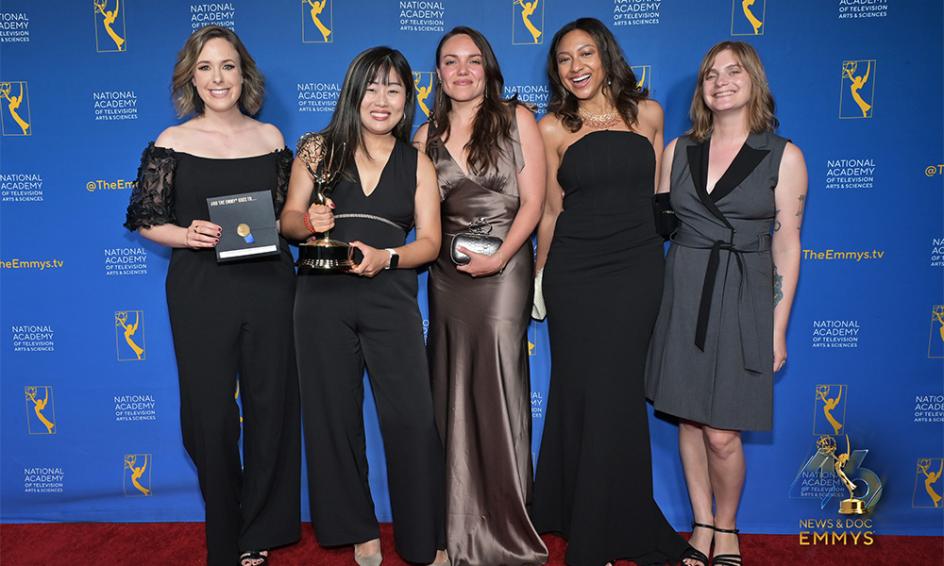
I’m all out of aloha. Lahaina is gone.
That’s the sentiment shared by the thousands of victims of the tragic wildfire that devastated Lahaina, on the island of Maui, Hawaii, in August 2023. The Lahaina community experienced profound loss of life, property, and culture as a result of the fire.
In all, 102 lives were lost, 11,000 were displaced, and 2,000 structures were destroyed in the “perfect storm” fire on Hawaii’s popular tourist spot.
And it didn’t have to happen, according to the PBS FRONTLINE documentary, Maui’s Deadly Firestorm, released in December 2024. A FRONTLINE team investigated the deadliest U.S. wildfire in a century, uncovering missed warnings that fueled its devastating spread. The documentary explored the fire’s origins, the chaotic emergency response, and how climate change and land use have made Maui increasingly prone to wildfires.
A core production team spent six months conducting interviews and creating compelling footage to tell the story. Then, they turned the process over to Heidelberg alumna Hannah Long-Higgins ’15 to edit the documentary.
As a freelance documentary film editor, Hannah spent nine months in post-production, sculpting an award-winning film whose music and narrative brought every moment alive and breathed powerful emotion into every voice.
The first half of the film is a minute-by-minute “reliving” of the fire, from 911 calls to cellphone video and police body cam footage. Hannah chose to use a “glitch” technique, flipping between before and after images, including dramatic drone shots of the burn zone. The second half is a powerhouse, packed with brilliant investigative journalism and interviews that intensified the emotional weight of the tragedy.
The end product was extraordinary – so much so that it was nominated for Outstanding Climate, Environment and Weather Coverage at the 46th annual News & Documentary Emmy Awards, hosted by the National Academy of Arts and Sciences June 25-26 in New York City.
And it won, beating out the likes of CNN’s Anderson Cooper, CBS News, and ABC News.
Joining Hannah in NYC to accept the Emmy were four members of the all-women core team who worked on Maui’s Deadly Firestorm: Xinyan Yu, Director; Koralie Barrau, Associate Producer; Kelsey Belrose, Assistant Producer/Researcher; and Christina Avalos, Producer. Also essential on the core team but not present at the Emmys were Jia Li, Director of Photography; Siyi Chen, Associate Editor; and Tanna Tarpley, Archival Producer.
Although bursting with pride, Hannah called the Emmy win “a weird juxtaposition.”
“It’s an odd thing to win an honor like this for work on a project that is so tragic,” she says from her home in Portland, Maine. “It still was a wonderful and really proud moment.”
Working on the project, from start to finish, was an amazing experience, especially at a time when the public media is facing a world of uncertainties in the face of political and funding challenges.
Hannah noted that she is personally very thankful to the people of Lahaina “who trusted us with their stories.”
“I hope (the film) does have an impact. I hope it invites people to think critically about how they prepare for disasters.”
“It’s a wild process of ups and downs, but you have to trust each stage and trust the people you work with.”
Going forward, Hannah is up for the challenges the industry presents.. “You do this work because you can't not do this work,” she says. “The truth is, getting the opportunity to work on this FRONTLINE film was both life-changing and career-affirming. Winning an Emmy with such an exceptional and promising young team was beyond what I could've hoped for.
“I have no idea what the ripple effects will be down the road, but I'm hoping it signals to future collaborators in the industry that I'm a serious and committed editor in this space and I'm just getting started.”
A rising career
Hannah spent five years as a versatile, “do-it-all” video journalist at the BBC’s Washington, D.C. bureau. Her transition into the film world began at a small production company, eventually leading her to leave her role overseeing the video team at the Chicago Council on Global Affairs to join the Frontline project in March 2024.
In film, freelancing is the way forward, Hannah explains. She has discovered that editing is where she truly shines. “I get a lot of fulfillment out of editing, so I decided to fully lean into that aspect. Editing gives me a way to bring together all the parts of who I am and my background.”
She also values the collaborative spirit of her work, which has included commercial and short film editing. Currently, she’s finishing up another film with Director Xinyan Yu for a PBS & Firelight Media series called In the Making about Vietnamese-American poet Cindy Tran. It will be released in 2026.
“There’s always a mix of things going on. We’re making it work,” she says.
The Heidelberg factor
The role of editor is also the role of artist and storyteller, and Hannah would be the first to acknowledge that Heidelberg played a major part in nurturing those qualities essential to the film industry. As she works to “bring all the pieces of a film together,” Hannah says she appreciates her liberal arts background for its opportunities to reinforce her natural sense of curiosity.
“It really does all connect when you talk, listen, and convey a vision,” she says.
She’s particularly grateful for the three years she spent as a member of Heidelberg’s Speech Team for three years. That experience cultivated her skillset as a storyteller and a writer. “That has been so valuable. I use it every day.”
“Heidelberg put the emphasis on the whole person and I value that so much too. … [In this field], we deal with some really sensitive stories. The person always comes first. That’s what made this project such a delight. I got to work with people who share that same ethos of treating people with sensitivity, care, and respect.”
You can view Maui’s Deadly Firestorm here.